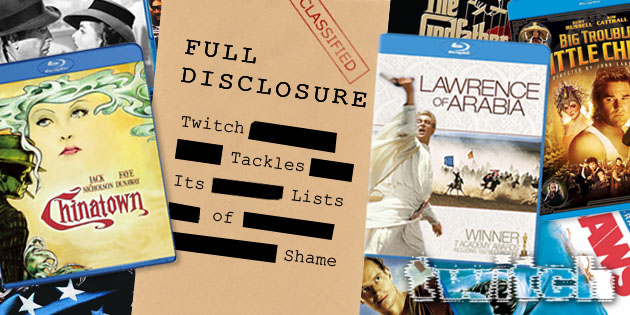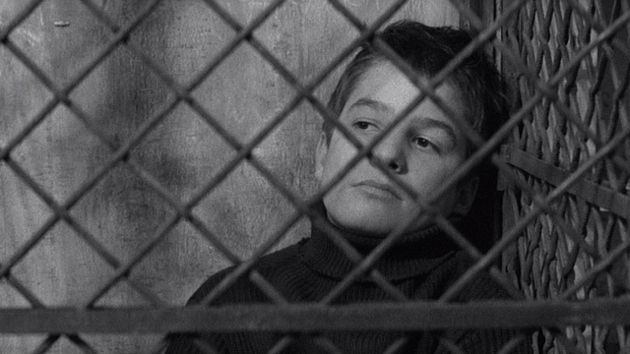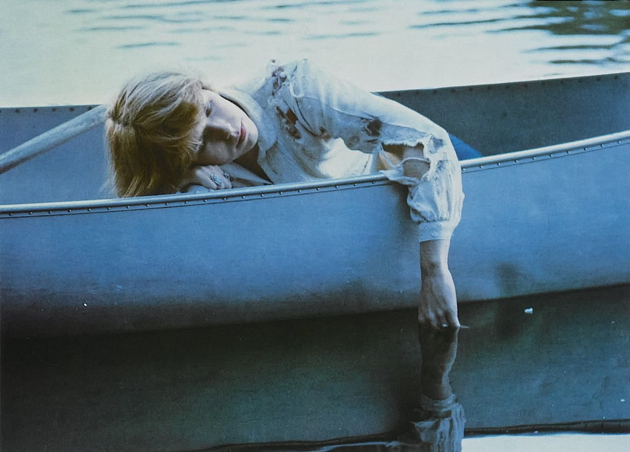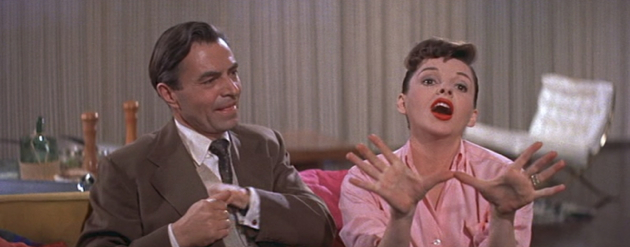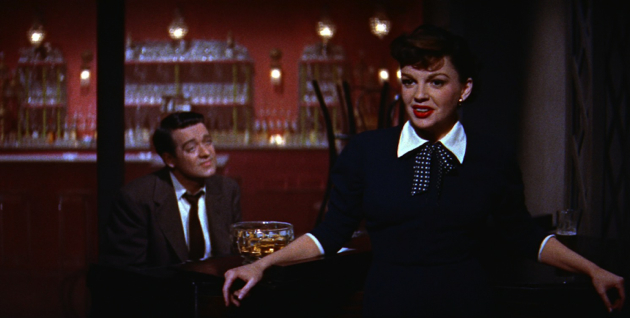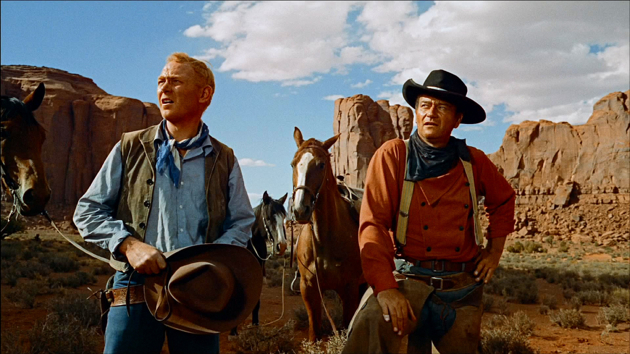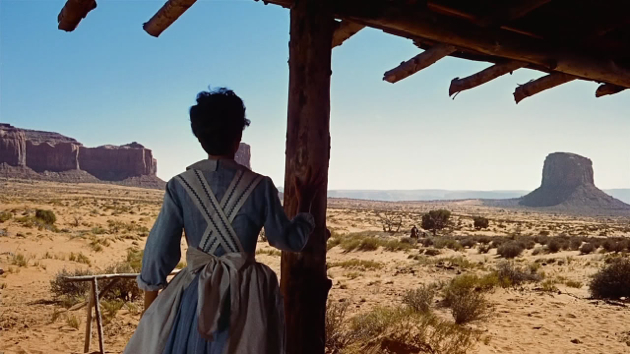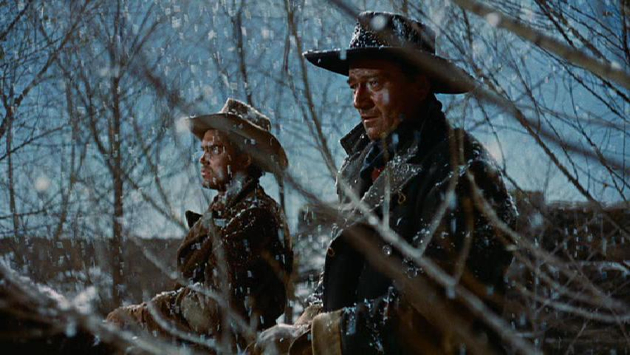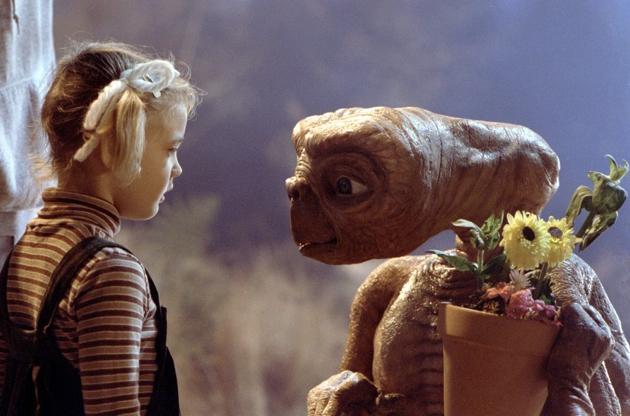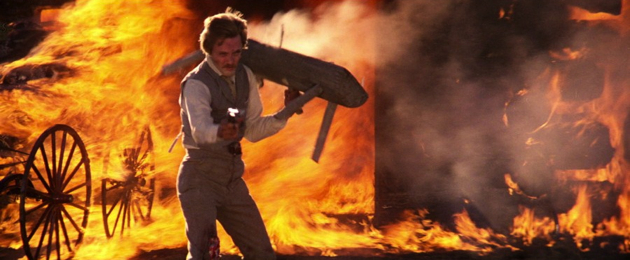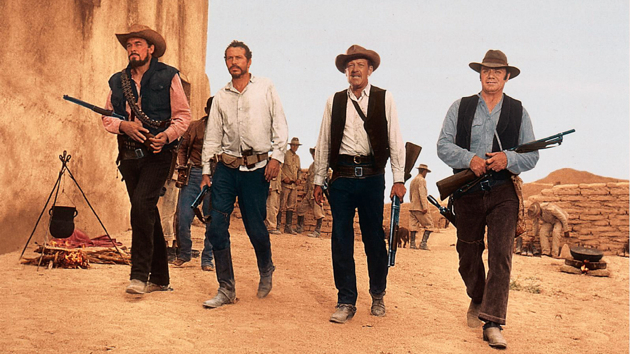Full Disclosure: ScreenAnarchy's Lists Of Shame - September
Peter Martin, Ryland Aldrich, Brian Clark, Jim Tudor, Ard Vijn, Eric Ortiz Garcia, Niels Matthijs, Ernesto Zelaya Miñano, James Dennis and Shelagh Rowan-Legg
contributed to this story.











The 400 Blows (dir. Francois Truffaut, 1959 France)
Winner of Best Director and OCIC awards at Cannes Film Festival, nominated for the Academy Award for Best Original Screenplay
Peter Martin, Managing Editor:
This sounds foolish in retrospect, but when the personal friendship between Jean-Luc Godard and Francois Truffaut cooled and then fractured publicly in 1973, film buffs began choosing sides. In the late 70s, I was captivated first by Godard's Breathless and, there and then, chose him over Truffaut, deigning to sample only Jules and Jim before deciding Truffaut was too mainstream for me.
Foolish! But now I have the opportunity to reboot my thinking about Truffaut, and his directorial debut is a splendid place to begin. His decision to draw from his own experience as a youth in wartime France may appear to be a sentimental inclination. Antoine Doinel (Jean-Pierre Leaud) stands in for the young Truffaut, and though he appears to be a whiny kid who rebels just to irritate those in authority around him, more than a few emotional and mental plates start to spin, and Truffaut keeps them all spinning, leading to a very solid finale. I still prefer Breathless as a debut, but The 400 Blows certainly does not feel very mainstream today. Instead it points forward to a career that I am, at long last, eager to explore.
Friday the 13th (dir. Sean S. Cunningham, 1980 USA)
Nominated for 2 Razzie Awards, including Worst Picture and Worst Supporting Actress
Ryland Aldrich, Festivals Editor:
Jason isn't even in Friday the 13th?! Well… as some kind film friends pointed out to me on Twitter after I exclaimed something similar, he is technically in the film for a few seconds. But it is far from the Jason Vorhees I'd come to associate as a classic 80s horror movie villain. Even if he does show up in the 1980 first entry in the series, he certainly isn't the villain. Also his iconic hockey mask is nowhere to be seen (I also learned from twitter he doesn't get that until the third film).
Having never seen a Friday the 13th film, I was pretty surprised at all of these facts. I was also surprised that aside from the last act, the film is more silly and fun than suspenseful and scary. I was also surprised by the heavy use of POV angles and odd filmmaking flourishes. It's a fine film, and like my Full Disclosure report on The Thing, I get the 80s horror nostalgia. But there wasn't much about Friday the 13th that made me want to watch the rest of the series. However, Camp Crystal Lake does seem like a pretty nice place to vacation (aside from all the killing, of course).
A Star Is Born (dir. George Cukor, 1954 USA)
Nominated for 6 Academy Awards, including Best Actor, Best Actress and Best Score
Brian Clark, European Editor:
Throughout George Cukor's A Star is Born, the bloated doomed love story was mostly overshadowed for me by the real life tragedy of Judy Garland. Certainly the star, who struggled with addiction and mental illness, wasn't at the very end of her career here, but the way her figure and even facial features seem to fluctuate throughout the film (one of many documented production problems) distracted me, and, taken with the alcohol abuse plot line, mostly made me think about her tragic life and untimely end.
But she could sure sing. Sadly though, besides the opening number where a very-drunk James Mason stumbles onto the stage, the song-and-dance numbers felt like unending intermissions, and added almost nothing to the film for me. As for the plot itself, it mostly made my mind wander to films I liked much more that dealt with the same subject matter; namely Singin' in the Rain and The Barefoot Contessa.
Only during the final twenty minutes did the the tragic love story fully engage me, mostly thanks to James Mason's heartbreaking performance and the beautiful, hypnotic cinemascope photography. But for most of the running time, I was either thinking about Garland, or kicking myself for choosing this version instead of the 1937 film, which was written by Dorothy Parker and directed by the almighty William Wellman (The Public Enemy, Safe in Hell). I bet that version is fantastic.
A Star Is Born (dir. George Cukor, 1954 USA)
Nominated for 6 Academy Awards, including Best Actor, Best Actress and Best Score
Jim Tudor, Contributing Writer:
George Cukor's 1954 sprawling remake of A Star Is Born portrays a dual Hollywood: a place of glamour, yet always dangerous. Cukor, the go-to filmmaker of the “women's picture” drama, is right at home in the overblown 1950s Hollywood musical, Cinemascope and all.
This is the second version of William Wellman's venerable 1937 A Star Is Born, that one a mere 111 minutes: famous movie star meets hungry singer, he gives her entry into the business, and she falls for him as thanks. Over the run of it, she goes up while he goes down. Not a complex tale in the telling, but in no way strictly lightweight. (Great cinema so often brings out the elusive depth in the straight-forward.) But, there's no reason for A Star Is Born to run three hours.
Cukor's balance of flamboyant artifice and stark reality play out in some brilliant moments. Judy Garland's first musical number demonstrates this well: Cukor's initial conventional head-to-toe framing gives way to a drunken James Mason shattering the visual familiarity, the camera shifting abruptly to a handheld low angle. (As the doomed Norman Maine, Mason is out of his element in a musical, yet he's the true heart of the film). The backstage lights penetrate the dance, as Garland must roll with it. Throughout the film, intense cartoony swaths of color are awash in thick, literal darkness.
Making this a Judy Garland comeback vehicle (following her termination from MGM) meant stocking it with all manner of musical numbers. Garland owns this one completely, but, by inflating her brighter persona, Cukor allows his desired darker authenticity to become diluted.
A Star Is Born, which ultimately cannot justify its bloated existence as a remake, stands in spite of itself as a glossy and grand musical example of 1950s across-the-board Hollywood right and wrong.
The Searchers (dir. John Ford, 1956 USA)
Ard Vijn, Contributing Writer:
John Ford's The Searchers is one of those films everyone kept telling me about, yet I never got to see for one reason or another. When I was young I gravitated to the fun westerns, and this wasn't considered to be one of those. Truth be told it wasn't even seen as much of a classic at that time. But later, in the eighties and nineties, people would start putting this on their "bestest ever" lists, and say how dark it was, adding the odd horror story about John Wayne's character in the film.
Given its reputation, I bought the Blu-ray of the restored version (with its controversial color-timing) a few years ago, but failed to actually watch it until now.
First thought as the opening credits start: Wow, this music is powerfully dated! But then someone opens a door upon Monument Valley, and all that's left is: Wow!
Make no mistake, this is one gorgeous looking film. And there is more: its story is pretty straightforward, but Ford takes his time telling it, and in the meantime he throws in a lot of small gestures, furtive looks, and little details. For each (too) obvious "Oh Golly!" moment there are things going on in the background which are far more subtle and interesting. There are hints at layers upon layers in these characters, and it gives the film depth and a strange extra sense of authenticity.
As for the darkness I was told about, damn, is it ever there. John Wayne's work as hero AND villain is fabulous. This film must have been at least a decade ahead of its time when it was released in 1956. It left me very much impressed, and even a bit shocked.
The Searchers (dir. John Ford, 1956 USA)
Eric Ortiz Garcia, Contributing Writer:
The story of John Ford’s The Searchers happens over a span of five years, in which Ethan (John Wayne) leads the search for his niece (the young girl Debbie), who was abducted by a group of Comanches. Set three years after the Civil War, the film is, at first sight, a classic western confrontation, between the war veteran Ethan and the Comanches.
Wayne is phenomenal, portraying this tough and clever Confederate. Ford make us believe for some moments that Ethan‘s past has something to do with the Comanches killing his family (brother, sister-in-law and other nephews), hence we think it’s all about his battle against the Comanche leader Scar. Ethan truly knows and dislikes Indians. In one really memorable scene, he shots to the eyes of a dead Comanche, in order to end with the Indian’s peaceful rest. He can be totally disgusting, for sure, but he’s always loyal to himself. And Tarantino can say he doesn’t like Ford, but his Aldo Raine character wasn’t the first one with an interest for the scalps of his dead enemies!
Wayne’s final confrontation with Scar is ultimately anticlimactic. It’s not a finale similar to those of Clint Eastwood films like The Good, the Bad and the Ugly or Unforgiven. The Searchers is more than just this confrontation, it’s an epic in the vein of my previous List of Shame title, Gone with the Wind.
While not as huge as Victor Fleming’s film, The Searchers touches similar themes, including the long absence of someone you care for. Some narrative resources are alike as well, like the use of letters. A love story too, with a girl waiting for Ethan’s partner/Debbie’s adoptive brother Martin (Jeffrey Hunter), Ford’s film is a really meaningful piece of American cinema.
The Searchers (dir. John Ford, 1956 USA)
Niels Matthijs, Contributing Writer:
Guess what. I don't like westerns. I don't like the new ones (True Grit), the old ones (Rio Bravo), the Italian ones (Once upon a Time in the West), nor the artistic ones (Dead Man). The cool ones (Django Unchained) and even the weird ones (Blueberry) don't do much for me either. Still I believe one should never give up hope, so I sat down to see why people made such big fuss about The Searchers.
Two hours later I'm none the wiser. The Searchers offers little beyond the usual western clichés, except that the characters turn out to be even bigger assholes than usually is the case. The overacting of most of the actors clearly didn't help. The only one putting in a decent effort is Wayne himself, but his character may be one of the least agreeable I've ever seen on film. I wanted him dead from the minute he joined the film, sadly director John Ford wasn't very cooperative in this respect.
The film is often praised for its visuals, but again I have to disagree. The setting is just horrible (I prefer green over brown), the colors a pain to the eye and the lighting simply way too harsh. Add some cheap costumes (the Indians look ridiculous), some laughable melodrama (the will scene) and a wasteful soundtrack and what is left is two hours of pure agony. Maybe it's just not meant to be.
E.T. The Extra-Terrestrial (dir. Steven Spielberg, 1982 USA)
Winner of 4 Academy Awards, including Best Sound, Best Original Score and Best Visual Effects
Ernesto Zelaya Minano, Contributing Writer:
Common sense dictates that I should have seen E.T. as a kid, but I have no memories of it. For a long time I felt as if I had missed out on something during my childhood (though The Neverending Story and The Goonies softened the blow). And really, this is a movie that’s better when watched as a kid; that way, you can get swept up in the magic of it all and not start nitpicking and finding flaws.
Movies nowadays are more often than not cynical and geared towards noisy spectacle. E.T. is the opposite, a sweet and good-natured story which we rarely get to see, one that’s almost impossible to dislike. There’s a real sense of wonder to seeing the alien creature learning to live in our world and befriending Elliot and the rest of the kids.
That’s why it becomes a bit anticlimactic when the NASA guys show up, since they take away from the focus of the film. Really, the sight of a bunch of people walking around suburbia in broad daylight in astronaut suits is just laughable. And does the climax feel rushed to anyone else? E.T. spends maybe two or three days with this family and suddenly they’re all the best of friends. I had to laugh at everyone’s cavalier attitude to having an alien suddenly show up or seeing a spaceship that looks like a Christmas tree ornament.
This is really my adult mind nitpicking. E.T. is a sweet little movie which can take you back to being a kid again, like it probably did for Spielberg. This is SUCH a Spielberg film. Hard to explain, but the overall ambience, the fascination with aliens, the John Williams score, everything screams of The Beard. And even after the impact it has had on pop culture, from the “phone home” catchphrase, to the rise in sales of Reese’s Pieces, to that godawful Atari game to the many parodies (best one being “D.T. the Drunken Terrestrial” from The Critic), it still manages to be surprising and moving. This is a movie I’ll definitely be showing to my kids someday.
Heaven's Gate (dir. Michael Cimino, 1980 USA)
Nominated for the Best Art Direction Academy Award, winner of the Worst Director Razzie Award
James Dennis, Contributing Writer:
I've waited to tackle this movie for some time now, primarily so I could give it the benefit of the doubt by viewing it in the most favourable circumstances possible. Epic movies need epic presentation. And it just so happens that said circumstances recently presented themselves by way of a remastered print at the BFI. This was the full 216 minute director's cut too (minus the BBFC excised "unsimulated animal cruelty").
Perhaps unsurprisingly, it's neither the unjustly maligned masterpiece some critics are re-evaluating it as, nor the abomination it was commonly branded as on its release. A string of often striking and masterfully shot set-pieces are hung together with the thinnest of wires. The narrative is often baffling and at times simply nonsensical. Yet it's a compelling watch throughout, with a love triangle of superb performances from Kristofferson, Huppert and Walken. I found the usually magnificent Bridges disappointingly inert though, with a prominent but slight role.
But what really hits home and, expensive folly or not, makes the biggest impact are the wonderously epic vistas. Kristofferson's arrival in the prosperous town of Casper is an astonishingly staged piece with a single establishing shot affording us an unfathomably complex mise-en-scene. If that shot was CGI'd today, it would still be a wonder. There are plenty of other eye-boggling moments too; the roller-skating fiddler, Walken's last stand and the Harvard dance amongst others.
Sure, you could pick it apart indefinitely and ultimately it doesn't work, but if you're going to stuff a movie, what a way to do it.
The Wild Bunch (dir. Sam Peckinpah, 1969 USA)
Nominated for 2 Academy Awards, including Best Score and Best Original Screenplay
Shelagh M. Rowan-Legg, Contributing Writer:
I think perhaps I picked too many westerns for my Full Disclosure list. Or perhaps just too many violent movies. But by the time I got to my first viewing of The Wild Bunch, I was getting a little tired. This is not to say I didn’t like the film, I did. But I don’t think I enjoyed it as much as I would have, had I not gotten a little tired of the genre.
At least this is later in the western genre’s original cycle, and is very much a Peckinpah film. I have mixed feelings about Peckinpah; on the one hand, his stories are very clearly about masculinity (i.e. not showing men and the male world as the centre of all perception and understanding of the human condition). On the other, his treatment of women and rape in Straw Dogs always left me a little shy of his work. Certainly, given that this was more than 40 years ago, high levels of violence in a film is no longer anything new. Still, the way Peckinpah portrayed violence remains disturbing. It is stylized, but not glamourized or used for humour. This is not the kind of violence that will make you cheer, either for hero or villain.
I felt little or no sympathy for any of the characters, though I’m guessing that was the point. It was definitely a different side of William Holden, who usually plays either a good guy, or a bad guy turned good. To see him in a role where he is so mean and ruthless was quite a shock; in comparison with Robert Ryan, they are two sides of the same coin, and neither one comes off better than the other. I’m not sure I appreciated the film as much as I would have if I’d seen it years earlier.

Around the Internet
Recent Posts
Ard's Dozen Of Musings About 2025
Now Playing: OBEX Delights, ALL THAT'S LEFT OF YOU Makes Choices
Friday One Sheet: REMNANTS
Leading Voices in Global Cinema
- Peter Martin, Dallas, Texas
- Managing Editor
- Andrew Mack, Toronto, Canada
- Editor, News
- Ard Vijn, Rotterdam, The Netherlands
- Editor, Europe
- Benjamin Umstead, Los Angeles, California
- Editor, U.S.
- J Hurtado, Dallas, Texas
- Editor, U.S.
- James Marsh, Hong Kong, China
- Editor, Asia
- Michele "Izzy" Galgana, New England
- Editor, U.S.
- Ryland Aldrich, Los Angeles, California
- Editor, Festivals
- Shelagh Rowan-Legg
- Editor, Canada


